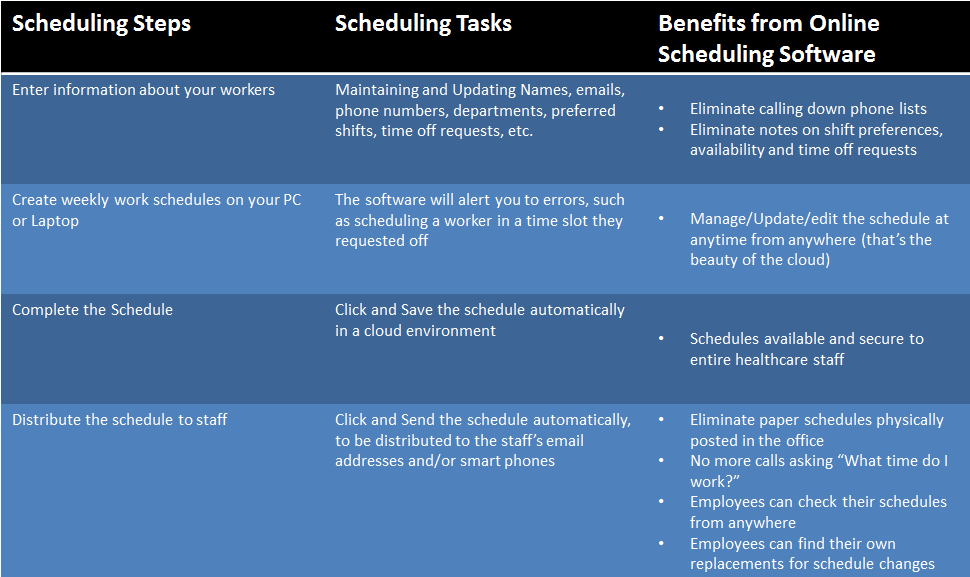How do you create a Time-off Policy
17 Dec, 2013 | Tags: bar scheduling software, conflict free schedules, Employee Schedule, Employee schedule calendar, employee schedule template, Employee Schedules, Employee Scheduling, employee scheduling programs, Employee Scheduling Software, hospital scheduling software, hotel scheduling software, job schedule, Job scheduling, Job Scheduling Software, Medical Scheduling, Medical Scheduling Software, online employee scheduling software, Online Restaurant Scheduling Software, online scheduling program, restaurant schedules, restaurant scheduling software, Retail Scheduling, Scheduling Software, Scheduling tools, Staff Scheduling, Staff Scheduling Software, What Time do I Work, Whattimedoiwork.com, Work Scheduling, Workforce Scheduling
For many companies, managing vacation and time-off requests is a constant challenge. You need to maintain adequate business coverage and support while understanding that your employees have times when they need to take time off. The outcome of not having a formal policy in place about when and how to submit requests results in employees asking for time off by:
- Talking to you in the hallway or your office
- Calling you on the phone
- Sending you an email
- Scribbling the days and dates on a piece of paper and dropping it on your desk
- Taping a note to your office door
These types of requests are not only hard to deal with on the fly, becasue of the no boundaries on “acceptable ways to request time off,” but you are also tasked with trying to keep track of who requested what time off. And if you have two employees requesting the same days off, who gets first dibs?
There are many different options and ways to create policies, but the most common in the service and health industries is to create a “time-off bank.” Here’s how the bank works. Let’s say each employee is allowed 160 hours off each year, which equates to 20 work days. The bank includes time off for:
- Holidays
- Vacation
- Sick days
- Personal days
You can’t always give all your employees all of the holidays off, so they can use their banked time to request vacations or personal/sick days off. Each employee is responsible for scheduling the days he or she wants off from work, using a single prescribed method, within the needs of the business. You can require that requests are submitted for planned time off within 2 weeks of the date, and that they must submit requests on special forms that are filed away for you to refer to when creating upcoming schedules
This plan offers many benefits to employees. They can:
- Ensure that their time off request will not be forgotten
- Assume responsibility for their own time off; they make their own choices, and they need to abide by them. For example, some employees might prefer a day off for religious holidays, rather than the Fourth of July.
- Draw from their time-off bank for emergencies, such as caring for a sick child. Remember, the bank is for all time off—holidays, vacation, sick days, and personal days.
The plan also offers many benefits to you. You will:
- Spend significantly less time managing time-off requests; all requests will come to you through the standard form submitted in the “time-off request box”
- Create more accurate schedules that require fewer changes, as you no longer have to try to remember who asked for what time off?
- Empower your employees by letting them make more choices about how they spend their time away from work
- Create a more positive working atmosphere at your company
All of these ways are great, but they are still time consuming, especially when going through all the requests each time you make the schedule. Wouldn’t it be nice if you had a way for the requests to be waiting for you right on the schedule? How about knowing when each request was submitted so that you can grant requests in a first come first serve method? The solution is available today from WhatTimeDoIWork.com and there are many other benefits far beyond tracking time-off requests and auto-populating them right into the schedule.
- Automatic alerts to scheduling conflicts and overtime hours
- Calculation of Labor costs as the schedule is created
- Posting of the Schedule online allowing employees easy access without picking up the phone
- Communications sent to your entire staff as soon as a new schedule is posted.
We are so sure that our software will solve your scheduling needs that we offer the first 30 days at no charge, with no obligation.
Learn more here.
What are the benefits of Online Employee Scheduling Software vs. the Traditional Methods?
05 Dec, 2013 | Tags: bar scheduling software, conflict free schedules, Employee Schedule, Employee schedule calendar, employee schedule template, Employee Scheduling, Employee Scheduling Software, hospital schedules, How do I create Conflict free schedules, job schedule, Job Scheduling Software, online employee scheduling software, online schedule, Online Scheduling, restaurant schedules, restaurant scheduling software, Schedule, schedule program, Schedules, Scheduling, scheduling best practices, Scheduling Programs, Scheduling Software, Scheduling tools, Staff Scheduling, staff scheduling softrware, web based scheduling software, Web Scheduling Software, What is the best online scheduling software, Why do I need Online scheduling software, Work Scheduler, Work Scheduling, Workforce Scheduling
Mr. Kennedy owns a midsize company called Kennedy Linens2Go, which supplies linens to hospitality businesses in the Boston, Massachusetts, area. The company operates a fleet of trucks that picks up dirty linens and drops off clean ones on a regularly scheduled basis. The principle staff members at Kennedy Linens2Go include truck drivers and linen washers.
During the majority of the year, scheduling the drivers and washers is a relatively quick and easy task. Workers have their preferred hours and shifts, and there are relatively few requests for time off. But in the summertime, workers want time off for vacations at the beach, to travel, and to spend time with their kids. Then during the holidays, people request time off to shop and attend special functions and spend time with friends and family. During these times of the year, Mr. Kennedy spends many hours each week preparing the weekly employee work schedules.
For Mr. Kennedy, creating an employee schedule for a typical pre-holiday week means:
- Accepting time-off requests from the staff via the phone, in his office, notes left on his desk or passing by in the hallway
- Creating a schedule based upon what Mr. Kennedy thought were all the requests
- Getting three last-minute requests from workers who forgot that Monday was the day to submit time-off requests
- Throwing away the original schedule and starting over again
- Finishing the second schedule, only to find that he forgot to include two part-time drivers
- Starting again on schedule number three
- Finally posting the schedule in the employee lunch room only to have one employee complain that they cannot work their scheduled shift after half of the employees have already seen the weekly schedule
- Once again he must start over for draft 4, and then contact all his employees to inform them that a new schedule is available
After two months of pre-holiday scheduling frustration, Mr. Kennedy needs some time off himself.
Rather than a vacation, Mr. Kennedy needs a new way to create weekly employee schedules. He needs a method that is quick and easy during every week of the year, even during the holidays. He also needs a much more efficient way to notify his employees of newly posted shifts and to avoid spending hours on the phone giving each of his employees their upcoming schedule, when they are not working. He needs to stop working in his business and start spending time on his business.
Luckily the perfect solution is available today from WhatTimeDoIWork.com. By offering, simple, flexible, realistic, easy-to-use online employee scheduling software, WhatTimeDoIWork.com enables Mr. Kennedy to store all his employees’ names, departments, skillsets, emails, phone numbers, preferred shifts, and requested time off in one online location. With point-and-click simplicity, Mr. Kennedy can create an employee schedule in minutes. And because all time-off and shift requests are stored in the software, Mr. Kennedy receives an alert when a scheduling conflict appears—such as trying to schedule a part-time driver on a day when she doesn’t work. Schedule changes are just as easy—Mr. Kennedy can simply cut-and-paste a time slot to a new name. Even better, all new schedules and changes are distributed to all staff members via email or smart phone, and remain accessible online to the entire staff 24×7. No more calling his entire staff not only when a new schedule is posted, but if there are any updates to the schedule.
Mr. Kennedy will find numerous benefits from online scheduling software:
- No more keeping notes of when employees want time off
- Ability to manage/update/change a schedule at any time
- No-shows are reduced; schedules are always available to the entire staff, so they all know their shifts
- No more paper schedules are required
- Employees can find their own replacements to cover in an emergency—removing Mr. Kennedy from the equation
- Automatic alerts of overtime hours or scheduling conflicts while creating the original employee schedule, which will cut down labor costs
- View labor dollars as the schedule is created
- Remind employees of upcoming shifts to eliminate no shows
To sign up for online employee scheduling software, Mr. Kennedy can simply visit https://www.whattimedoiwork.com/free-trial/. He can discover for himself how much time, effort, and frustration he’ll save by moving his employee work schedules online.
Try it out today with our 30 day no obligation free trial. And when we say free we mean free:
- No credit card is necessary to try the software
- No service contracts or hidden fees
- No downloads required
How can you make medical on call scheduling more efficient?
21 Nov, 2013 | Tags: Employee Schedule, Employee schedule calendar, Employee Scheduling, Employee Scheduling Software, hospital scheduling software, job schedule, Job scheduling, Job Scheduling Software, Medical Scheduling, online employee scheduling software, online schedule, Online Scheduler, Online Scheduling, online scheduling program, Schedule, Schedules, Scheduling, Scheduling Programs, Scheduling Software, Scheduling tools, Shift Scheduling, Staff Sche, Staff Scheduling, Staff Scheduling Software, Web Scheduling Software, What Time do I Work, Whattimedoiwork.com, wor, Work Scheduler, Work Scheduling, Work scheduling software, Workforce Scheduling
For every industry sector, effective communications are key elements of success. But for organizations that operate in the healthcare industry, clear and timely communications are critical to the well-being of not only staff members, but also patients. One type of internal communication that has historically held considerable room for improvement is on-call scheduling. Managing on-call coverage in all departments all the time can be confusing, to say the least. Normal day-to-day scheduling is simple by comparison.
Let’s assume you completed your on-call schedule for November 4, 2013. You assigned general physicians, nurses, anesthesiologists, surgeons, radiologists as your on-call staff from 11 p.m. to 7 a.m. You used a spreadsheet to create the schedule, and you posted it in the staff lounge. As far as you’re concerned, all the bases are covered, and your job it done.
Now let’s assume that your facility faces a flu epidemic, and it’s affecting not only your patients, but also your staff—including your on-call people. With a steady intake of new patients, you need a full complement of staff members on the floor. As the scheduling manager, it’s your job to find people to fill in for those who are sick. This means calling people, one by one, department by department, until you find the coverage you need. And knowing the flu spreads like wildfire, you can look forward to the exact same crisis tomorrow.
This scenario is rather drastic, but it clearly shows that it’s time for a change—one that removes the frustration and stress from on-call scheduling. You can make the change today—by replacing your traditional manual scheduling process with online scheduling software. By storing all medical staff members’ contact information, department, availability, and previous schedules in the cloud, you can quickly and easily create on-call schedules that work for your employees and your company. And you can start using it today, by visiting WhatTimeDoIWork.com.
One of the primary benefits of on-call scheduling with WhatTimeDoIWork.com is enabling all staff members to see the schedule all the time. This way, staff members can take control of their working hours. They can own the responsibility of finding a replacement for their on-call hours in case of illness, emergency, or other unforeseen problems. And for those staff members looking to pick up extra hours, the software enables off-schedule workers to contact on-call employees and ask to pick up a shift.
The beauty of the entire system is that you are removed from the equation—all changes happen in the cloud, are distributed to all staff members via email or smart phone, and remain accessible to your entire staff 24×7.
Here’s what you do:
To sign up now for online employee scheduling software visit our website and discover for yourself how much time, effort, and frustration you can save by moving your weekly and on-call scheduling to the cloud.
How to Schedule Efficiently In the Cloud
14 Nov, 2013 | Tags: Employee Schedule, Employee schedule calendar, Employee Scheduling, Employee Scheduling Software, Employees Schedules, job schedule, Job Scheduling Software, online employee scheduling software, Online Restaurant Scheduling Software, online schedule, Online Scheduler, Online Scheduling, online scheduling program, restaurant schedules, Retail Scheduling, Schedule, Scheduling Software, Scheduling staff members, Staff Scheduling Software, Web Scheduling Software, What Time do I Work, Whattimedoiwork.com, Work Scheduler, Work Scheduling, Workforce Scheduling, workscheduling
When you look to the future and see yourself repeating the same manual scheduling process, every single week, from now until who knows when, how do you feel? Frustrated? Overwhelmed? Exhausted? Bored? Or perhaps a combination of all four.
Let’s consider that the “same old thing” is creating your restaurant’s weekly staff schedule. Every week, you:
- Pull out a new schedule sheet or spreadsheet
- Gather together this week’s requests for time off and preferred shifts
- Get prepared for requests to come in after you complete the schedule
- Plug in names to time slots
- Take a break and drink some coffee
- Return to your office, review the schedule for accuracy, and correct any mistakes
- Tentatively post the schedule on a wall somewhere
Now let’s consider a new future—one where creating the weekly staff schedule is a fast, easy, and stress-free task. In this new future, there is no paper, no pencil, no spreadsheet, and no haphazardly received requests for time off and shift changes. No more need for a calculator to avoid overtime shifts. This new world also includes virtually instantaneous changes to schedules to accommodate illness or emergencies, with automatic real time communication to all employees about updated schedules that are available. Even more, this brave new world of job scheduling reduces no-shows because your workers are better informed about when they work (and can set up alerts to remind them of upcoming shifts).
When you look to the future and see yourself repeating the same manual scheduling process, every single week, from now until who knows when, how do you feel? Frustrated? Overwhelmed? Exhausted? Bored? Or perhaps a combination of all four.
Let’s consider that the “same old thing” is creating your restaurant’s weekly staff schedule. Every week, you:
- Pull out a new schedule sheet or spreadsheet
- Gather together this week’s requests for time off and preferred shifts
- Get prepared for requests to come in after you complete the schedule
- Plug in names to time slots
- Take a break and drink some coffee
- Return to your office, review the schedule for accuracy, and correct any mistakes
- Tentatively post the schedule on a wall somewhere
Now let’s consider a new future—one where creating the weekly staff schedule is a fast, easy, and stress-free task. In this new future, there is no paper, no pencil, no spreadsheet, and no haphazardly received requests for time off and shift changes. No more need for a calculator to avoid overtime shifts. This new world also includes virtually instantaneous changes to schedules to accommodate illness or emergencies, with automatic real time communication to all employees about updated schedules that are available. Even more, this brave new world of job scheduling reduces no-shows because your workers are better informed about when they work (and can set up alerts to remind them of upcoming shifts).
If the new future sounds like the right future for you, you can get it now by choosing our online employee scheduling software. Our unique program has advanced features yet easy-to-use. Some of the great time and money saving features include:
- Build new schedules based on saved versions of past schedules
- Speed up the scheduling process with all the needed employee information—name, contact information, preferred shifts, time off requests, departments, pay rates, hire dates—in one central location
- Create conflict-free schedules; if you make a mistake, such as try to schedule an employee in a time slot he requested off, the software alerts you immediately
- Store all schedules and employee information in the cloud, where it remains available 24×7 from anywhere
- Eliminate random phone calls and other ways that employees request time off
- Free up time in your own schedule for more important activities—like running your business
- Significantly improve employee communications because workers:
- Can see when there are open shifts, and offer to pick up extra hours when they want
- Receive each week’s schedule and all schedule changes on their smart phone or email
- Can find their own replacements without having to bother you
No matter what your industry, What Time Do I Work’s Online Scheduling Software has the solution to your scheduling needs. Discover for yourself just how much time and energy you can save by using our employee scheduling software. Sign up today for your no obligation 30 day Free Trial at https://www.whattimedoiwork.com/free-trial/.
No-Call control over fluctuating schedules
07 Nov, 2013 | Tags: Employee Schedule, Employee schedule calendar, Employee Scheduling, Employee Scheduling Software, Employees Schedules, job schedule, Job Scheduling Software, online employee scheduling software, online schedule, Online Scheduler, Online Scheduling, online scheduling program, Online Scheduling Software, Retail Scheduling, Schedule, Scheduling, scheduling program, Scheduling Software, Staff Scheduling Software, Web Scheduling Software, What Time do I Work, Whattimedoiwork.com, Work Scheduler, Work Scheduling, Workforce Scheduling, workscheduling
Whether your organization operates in retail, healthcare, hospitality, casinos/gaming, or fitness, you face the challenge of managing fluctuating schedules. You have full-time and part-time workers, as well as those who work only nights, only weekends, not on holidays, or any combination of those. While you pride your organization on flexibility and the desire to accommodate your workers’ lifestyles and availability, creating schedules that work for your employees and your company is an ongoing battle.
In addition to special requests for time-off, you must also handle the scheduling changes that occur at various times of the year:
- During the school year, you have to work around class schedules.
- At holiday times, you need to accommodate seasonal parties and family time.
- In the winter, you have to juggle slow customer traffic and bad weather.
- At any time of the year, you need to prepare for unplanned illness and emergencies.
Regardless of the reason why, you end up changing your work schedule weekly to meet your staff’s changing needs. Using traditional scheduling methods like paper and pen or spreadsheets usually results in revisions, trashed and re-posted schedules, not to mention untold numbers of calls from your employees, asking, “What Time Do I Work?”
Today is the day to say “good-bye” to your traditional scheduling methods and say “hello” to something new. You can trade in your paper and pen for online scheduling software from WhatTimeDoIWork.com—a revolutionary employee scheduling software that not only saves you time, money, effort and frustration, but also allows you to handle fluctuating schedules with ease.
By creating all your work schedules online and storing them in a secure cloud environment, you benefit on many levels:
- Remain up to date – All your workers’ contact information—names, emails, phone numbers, preferred shifts, time-off requests, skill sets, etc.—remain up to date and available 24/7.
- Save time –create weekly work schedules quickly and easily on your PC or laptop—anywhere, at any time.
- Get more efficient — effortlessly avoid errors and conflicts with automatic alerts, our software lets you know when there’s a problem, such as scheduling a worker in a time slot he/she requested off.
- Automate the process –complete your schedule by clicking Save, and the schedule is automatically stored in the cloud.
- Enhance communications with employees — Rather than posting a paper schedule (only available in the office), click Post, and the schedule is automatically distributed to your employees’ email addresses and/or smart phones, eliminating calls about “What Time Do I Work.”
An added benefit of storing all workforce schedules and employee information in the cloud is that it remains available to all your workers all the time. This means that when an emergency arises, an employee can simply access the cloud, find out who isn’t scheduled to work, and find a replacement. Workers can update their information in real-time, and everyone in your company will be up to date on what’s happening.
To discover for yourself just how much time and money you can save by using our web scheduling software, take a few minutes to watch our informative video at https://www.whattimedoiwork.com/free-trial/








